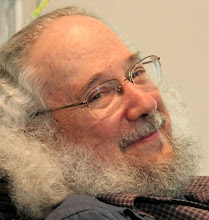Epistemology matters
Yesterday the family went down to the Stewart/Colbert Sanity/Fear rally. (I was stuck at home with a sprained ankle but I watched it live online.) The mall was packed! The family brought home pictures. Here's one. Courtesy, A. Fripp.)
My estimation of how many people it took to fill that Mall is ¼ million. (I gave that estimation as an exam problem a few years ago.) In the Washington Post this morning, Robert McCartney derides the whole rationality idea quoting Frost, “A liberal is a man (sic) too broadminded to take his own side in a quarrel.” What McCartney – and apparently Robert Frost – don’t get (and John Stewart does), is that rationalist are not dualists (cf. Wm. G. Perry, Jr.) who believe that there are only two sides to a quarrel. Rather, those of us we consider ourselves rationalists believe that we have reasons for the points of view we take and are therefore willing to participate in a conversation with and perhaps be convinced by people on the other side – if they have better reasons than we do. Or if not, we are still willing to consider compromise. This, a point made clearly by Stuart and Colbert, is what is sorely missing from our current political dialog.
Now I am no longer a strong believer* in Perry’s “epistemological stages” of intellectual development. I was once, and summarized them briefly as “dualist”, “relativist”, and “constructivist”. The last is someone who understands that knowledge is tentative, but is willing to take a stand on the grounds that, “this is what seems best to me now given what I know now.” (Perry has 8 stages with substages.) A constructivist is amenable to evidence and change of their viewpoint based on evidence. I consider that helping students develop that understanding of the nature of knowledge is a major point of attending college in the first place. McCartney gives pretty good evidence that maybe we do have to view at least politics through the lens of Perry’s stages of epistemological development.
[*My current take on epistemological development is strongly influenced by Elby and Hammer’s “epistemological resources”, which takes a more dynamic view of how people use their knowledge of how we know something.]



2 Comments:
You somewhat imply that the higher epistemological stages of intellectual development tend to be inhabited by liberals. I wonder whether this is true.
Are there conservatives who think in the higher stages? Or by definition, are conservatives those who miss the bigger picture and devolve into the black-and-white view of the world?
Are the stages a proxy for liberalism or for intelligence/education?
By mlf, at 6:23 PM
mlf, at 6:23 PM
I would say no in principal. Conservatives can be rational and leftists can be just as ideologically dogmatic (and non-rational) as rightists. It can be very rational to say "be careful in making changes because we aren't always sure of the consequences." But saying, "don't change anything, no matter what happens" shuts off rational discourse. I would like to see a lot more empiricism in modern politics. I wish some commentator would ask a political bloviator, "What's your evidence?" Wouldn't it be great if that became a standard question with people thinking about and elaborating on the answers?
By An Unabashed Academic, at 10:41 PM
An Unabashed Academic, at 10:41 PM
Post a Comment
<< Home